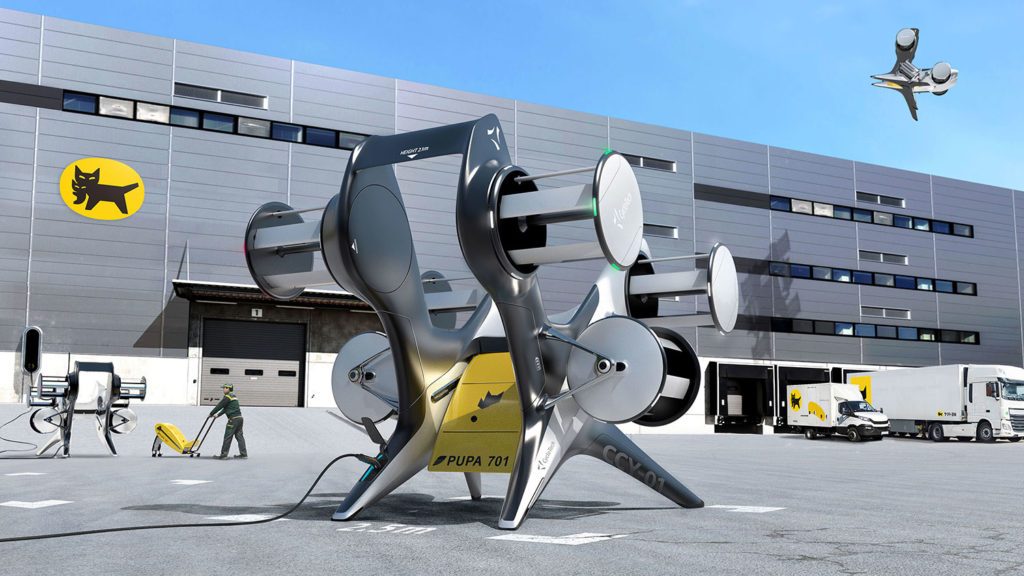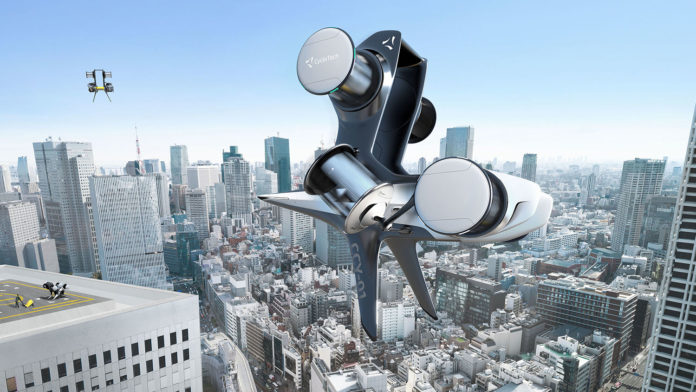Imagine if a parcel you are to receive could fly and perch into your neighborhood like a bird. An Austrian startup CycloTech has partnered with Yamato, one of Japan’s largest delivery companies, to make this happen.
The two companies have completed a study into the feasibility of developing an uncrewed cargo eVTOL aircraft using thrust-vectoring cycloRotor propulsion to operate in confined urban areas, even in challenging wind conditions. The study incorporated two innovative elements: PUPA701 (Pod Unit for Parcel Air-transportation), developed by Yamato, and CycloRotors, an innovative 360° thrust vectoring aviation propulsion system developed by CycloTech.
As a part of the study, CycloTech and Yamato have developed an innovative cargo eVTOL concept using Cyclotech’s thrust-vectoring propulsion system. This unique-looking mid-capacity delivery drone design features a battery-powered, distributed electric propulsion system configuration with six omnidirectional thrusts generating CycloRotors.
Based on the same principle as the Voith-Schneider-Propeller, CycloRotors offer a solution with direct and instant control of magnitude and direction of thrust in a full circle of 360° – up, down, forward, backward – whereas all other propulsion systems basically only push or pull into one single direction.

Named CCY-01, the aircraft uses four propulsion units as per normal but adds two additional ones at a 90-degree angle to the rear. The six-rotor configuration for this aircraft permits a safe and stable landing even if one CycloRotor fails. After take-off, the aircraft leans smoothly forward by 45-degree into the flight mode, easily done with the thrust vector system. In forwarding flight mode, the vehicle uses optimized rotor settings and utilizes the PUPA as an airfoil reducing drag.
This CycloRotor redundancy coupled with the omnidirectional thrust system ensures a safe flight mission with high maneuverability, even in harsh weather conditions.
The cargo drone body is designed to accept the PUPA701, a part of Yamato’s PUPA family of detachable and compatible cargo pods. Although multiple types of PUPA have been planned so far, PUPA701, which is built as a neat little pushcart capable of carrying about 30 kg of payload, is chosen for this study. PUPA701 has its integral elevator system to lift and lower itself onto the suspension rail attached to its lift-craft while extending and retracting its gears for ground mobility.
The CCY-01 cargo drone is capable of transporting a 45 kg payload (including the dry mass of the detachable pod) over a distance of 40 km (25 miles) at speeds up to around 130 km/h (81 mph). Its compact design of only 2.7 x 2.5 m square footprint offers unobstructed, ergonomic access to the PUPA701 bay. During the exchange of the PUPAs, the cargo drone can be connected to a power supply to recharge the batteries. It is also possible to exchange the battery packs to speed up the charging procedure.
All operations can be handled from one side – be it loading and unloading the payload, complete swap of the pod, or charging or exchanging batteries – which is an important feature when the operation takes place at elevated landing pads or confined areas.
At the moment, the CCY-01 is just a concept drone. As the advantage and feasibility of CycloRotor-applied cargo eVTOL aircraft have been successfully discovered, Yamato will accelerate pursuing the realization of a high value-adding airborne logistics operations with the technical premises expanded by this study.
